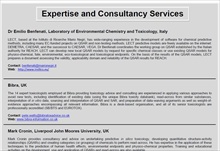Channels
Special Offers & Promotions
Peta Launches In Silico Testing Resource to Reduce Number of Animal Tests
publication date: Mar 1, 2012
|
author/source: PETA
 Seeking
to maximise the value of computational modelling in avoiding animal testing for
the European Union's Registration, Evaluation, Authorisation and Restriction of
Chemicals (REACH), the People for the Ethical Treatment of Animals (PETA)
Foundation has produced a free resource for chemical companies, identifying
sources of information and expertise on the use of Quantitative Structure
Activity Relationships (QSARs). The short brochure "QSARs and REACH: A
Guide to Sources of Information and Advice" was produced in consultation
with leading experts in the field and lists publicly available online resources
and selected contact points for individuals and organisations that can offer support
on the use of QSARs to companies registering chemicals under REACH.
Seeking
to maximise the value of computational modelling in avoiding animal testing for
the European Union's Registration, Evaluation, Authorisation and Restriction of
Chemicals (REACH), the People for the Ethical Treatment of Animals (PETA)
Foundation has produced a free resource for chemical companies, identifying
sources of information and expertise on the use of Quantitative Structure
Activity Relationships (QSARs). The short brochure "QSARs and REACH: A
Guide to Sources of Information and Advice" was produced in consultation
with leading experts in the field and lists publicly available online resources
and selected contact points for individuals and organisations that can offer support
on the use of QSARs to companies registering chemicals under REACH. QSARs predict chemical behaviour directly from chemical structure and simulates adverse effects in cells, tissues and lab animals, minimising the need to use animal tests to comply with regulatory requirements for human health and ecotoxicology endpoints. The REACH regulation promotes the use of alternative methods and states that animal testing should be a last resort. The use of QSAR is specifically encouraged. However, while QSARs have already been used in many registrations, it is clear from the European Chemicals Agency's (ECHA) 2011 report, "The Use of Alternatives to Testing on Animals for the REACH Regulation", that many opportunities to use them have been missed and that, in some cases, registrants have not submitted QSAR data in accordance with REACH's requirements, leading to potential rejection by ECHA, additional costs, and increased animal testing.
"QSARs can already replace many animal tests and it is vital that they be used for REACH, which threatens tens of millions animals in new testing," says PETA policy adviser Alistair Currie. "It's heartening that the REACH legislation recognises their value but registrants must feel confident both with the use of the technology and with integrating it into weight-of-evidence arguments that the regulator will accept. It's clear from our discussions with companies that those less familiar with its use feel cautious about using it to replace testing. This resource answers the need to link the experts in QSAR use for REACH with the registrants who need that expertise."
The list was compiled by PETA in consultation with PETA US and contacts within industry and academia, and selection and inclusion was based entirely on expert judgment - the list contains no paid advertising. The resource is currently being distributed gratis to chemical companies, consultants and other stakeholders and is available online at PETA.org.uk/QSAR.
Media Partners


